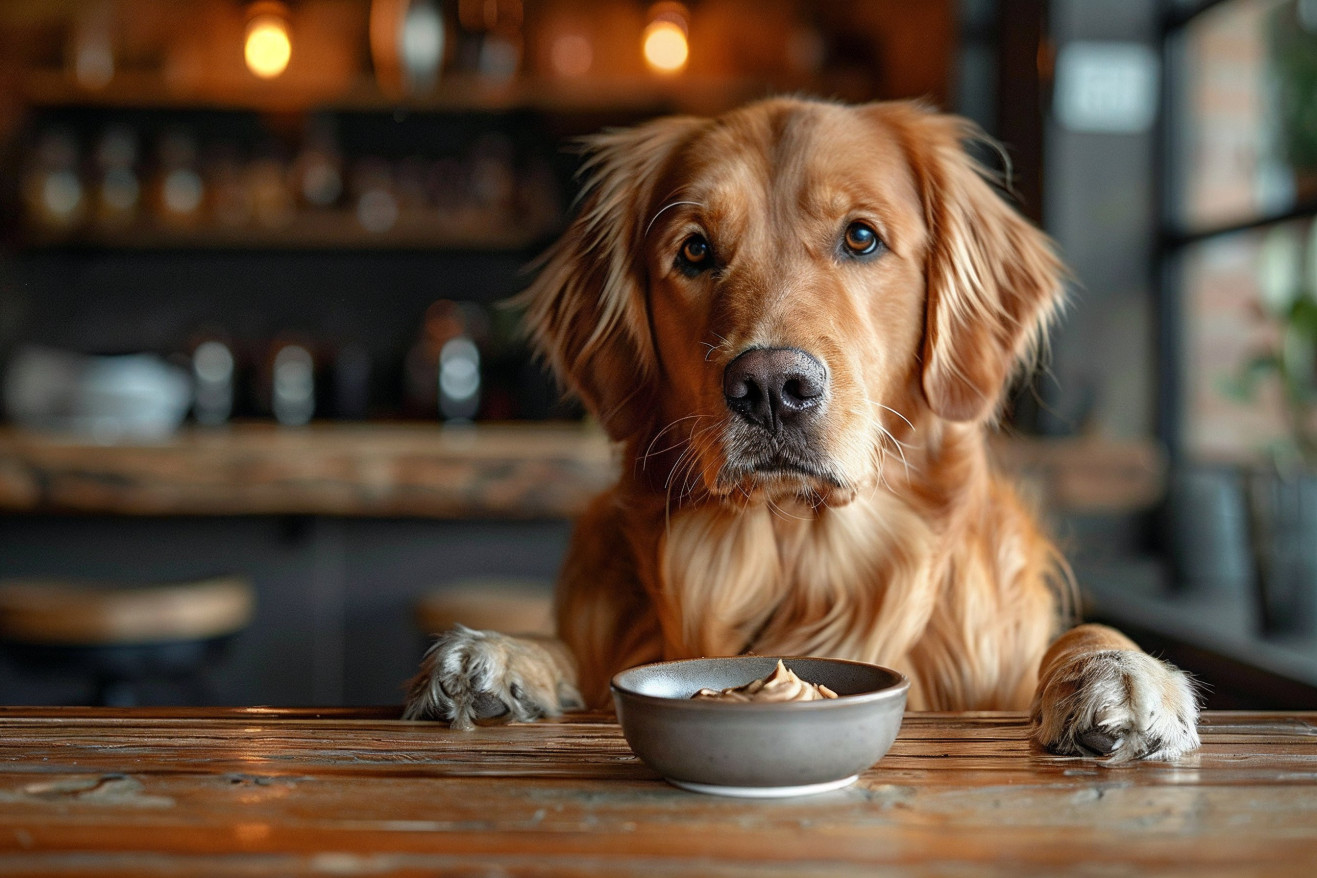Can Dogs Eat Almond Butter? Nutritional Facts and Precautions
14 March 2024 • Updated 13 March 2024

While you might enjoy almond butter as a delicious and nutritious snack, you may be wondering if it’s safe to share this treat with your dog. In general, almond butter is safe for dogs as long as it’s fed in moderation and free of xylitol and other harmful ingredients.
However, its high fat content can lead to gastrointestinal issues, so it’s best to feed it in small amounts and keep an eye out for any adverse effects. For personalized advice, always consult your vet.
This article will use insights from veterinary science, studies on canine nutrition, and expert advice on pet nutrition to help us explore the nutritional facts of almond butter and how it interacts with a dog’s metabolism. We aim to give you a well-rounded view of the potential benefits and dangers so that you can decide whether or not to include almond butter in your dog’s diet.
Can dogs eat almond butter?
Almond Butter: Nutritional Facts for Dogs
When consumed in moderation, almond butter can be a healthy addition to your dog’s diet. It’s a good source of protein, which is important for muscle growth, and vitamin E, an antioxidant that supports the immune system.
Almond butter also contains magnesium, which is important for nerve and muscle function and energy production. However, it’s high in fat, and while fat is an important part of a dog’s diet, too much can lead to health problems like pancreatitis and obesity.
It’s important to make sure the almond butter you’re feeding your dog doesn’t contain xylitol, a sweetener that’s toxic to dogs and can cause hypoglycemia and liver failure, according to the FDA. You should also avoid almond butter with added sugars and salts, which can be bad for your dog.
Volhard Dog Nutrition recommends that you feed your dog small amounts to get the benefits without the health risks, with a teaspoon or less (depending on the size and dietary needs of your dog) as a general rule.
Compared to peanut butter and cashew butter, almond butter is generally higher in vitamins, minerals, and fiber, so it has a slightly better nutritional profile for dogs. Make sure you’re giving your dog the safest and healthiest option by checking labels and talking to your vet for personalized advice.
Fat in the Dog Diet: Pay Attention to Metabolism
While fat is necessary in a dog’s diet for energy and the absorption of fat-soluble vitamins, it’s important to remember that dogs metabolize fat differently than humans. This means that fat intake must be carefully managed, especially when it comes to high-fat foods like almond butter.
According to PubMed, lipid metabolism in dogs is different than in other species, and overconsumption of fat can lead to hyperlipidemia, which is associated with pancreatitis and liver disease.
The consequences of a high-fat diet in dogs are serious. A study published by PMC found that high-fat diets can lead to inflammation and obesity, a common problem in dogs that has been linked to a number of health issues, including a shorter lifespan and a greater risk of developing a variety of diseases.
This further emphasizes the need for careful dietary control and close monitoring of a dog’s health when new foods are added to their diet.
To avoid potential problems, start by giving your dog a small amount of almond butter to see how they react. Look for signs of digestive issues or weight gain, and consult a veterinarian for personalized guidance. If you take these steps, you can make sure that you’re giving your dog almond butter as a treat in a way that won’t harm their health.
The Surprising Danger: Xylitol in Almond Butter for Dogs
While almond butter can make a great snack for your dog, the inclusion of xylitol makes it a potentially lethal poison for dogs. Xylitol, an increasingly common sugar substitute found in many human foods, can result in severe hypoglycemia and liver damage in dogs.
When dogs eat xylitol, it causes a rapid release of insulin in their bodies, which leads to a rapid and profound decrease in blood sugar. This can result in seizures, liver failure, and death.
VCA Animal Hospitals explains that clinical signs of xylitol poisoning can develop in as little as 30 minutes after ingestion, although it can take up to 12 hours. The Merck Veterinary Manual explains that clinical signs of xylitol poisoning include vomiting, weakness, ataxia, seizures, and coma, with clinical signs of liver failure such as jaundice potentially appearing later.
A case report published in PMC emphasizes the importance of immediate veterinary care, as aggressive treatment led to the successful recovery of a dog with acute hepatic failure due to xylitol toxicity.
To protect your dog, always check the label of any almond butter you buy for xylitol, and only choose products that specifically say they are free of the sweetener. With the increasing prevalence of xylitol in human foods, it’s more important than ever to be careful about the amount of human food and treats your dog eats.
How to Introduce Almond Butter to Your Dog’s Diet
If you do decide to introduce almond butter or any other new food into your dog’s diet, you’ll want to make sure you work with your vet to do so. The American Kennel Club recommends that you introduce the new food over a 5–7 day period to avoid gastrointestinal upset and give your dog time to adjust.
You can start by adding a small amount of almond butter to your dog’s current food and then gradually increasing the amount of almond butter while decreasing the original food.
You’ll also want to watch for signs of food allergies or intolerances, like gastrointestinal issues or skin problems, which can pop up when a new food is introduced. PetMD notes that it’s important to monitor your dog’s reaction to dietary changes since every dog is different. Your vet will be able to help you manage these changes and ensure that you can address any negative reactions.
By working with your vet to make sure that your dog’s diet is tailored to their specific needs and health issues, you can make sure that you’re taking a holistic approach to their nutrition. This will help you make sure that you’re on the right track when it comes to making dietary changes and that you can help your dog live their healthiest life.
Final Thoughts: Almond Butter and Your Dog’s Health
Almond butter can be a healthy snack for dogs as long as it’s given in moderation and free of xylitol and other harmful ingredients. We’ve covered its impressive nutritional content, which can be helpful in the right amounts, and we’ve emphasized the importance of avoiding artificial sweeteners that can be poisonous to dogs.
It’s important to know your dog’s specific metabolic requirements and to look out for any signs of intolerance or negative side effects.
To be safe, make sure to give your dog almond butter under the supervision of a vet to make sure it’s an appropriate addition to your dog’s diet.
The importance of the balance between treating your dog and keeping them healthy can’t be overstated, and this is where responsible pet ownership comes into play.
Making educated decisions about what your dog eats, with the help of a professional and close monitoring, will help you decide whether or not to incorporate human foods like almond butter into your dog’s diet. Always make sure to keep your dog’s best interest at heart and check with your vet if you’re ever unsure about what to do.


